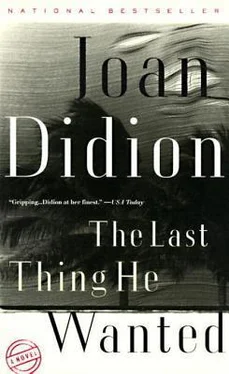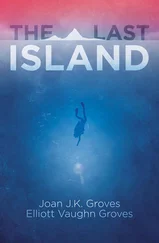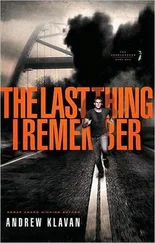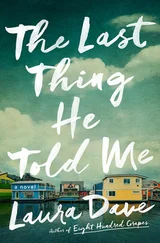The lesson would have been that no one else will ever view our lives exactly as we do: someone else had looked at the snapshots and seen the two children but had failed to hear the music, had failed even to know or care that he or she was lacking the emotional score. Just as someone else could have looked at the snapshot Elena McMahon took from her mother’s bedroom and seen her father holding the beer and her mother in the apron printed with pitchforks ( “man and woman at barbecue”) but never seen the fat little sizzler rockets, never seen the sparklers that made fireflies in the hot desert twilight. Never heard half a margarita and I’m already flying, never heard who needs the goombahs, we got our own show right here.
I knew all that.
The conventions of the interview nonetheless required that I ask the obvious question, follow up, encourage the subject to keep talking.
50:05. “What was the lesson,” I hear myself say on the tape.
“In the first place,” Treat Morrison says on the tape, “it wasn’t some ‘stream,’ we didn’t have ‘streams’ in California, ‘streams’ are what they have in England, or Vermont, it was the goddamn Russian River.”
Another pause.
“In the second place we weren’t ‘playing.’ She was eleven, for Christ’s sake, I was four, what would we ‘play.’ We were getting our picture taken, that’s the only reason we were even together.”
And then, without a beat: “Which has to kind of give you an insight into how differently an Israeli and a Palestinian might view the same little event or the same little piece of land.”
That was one of Treat Morrison’s two ventures into the personal.
The second such venture is also on tape, and also has to do with his mother. It seemed that he had arranged to have his mother driven to Berkeley to see him receive an honor of some sort. He did not remember what the honor had been. What the honor had been was not the point. The point was that because they would have no other time alone, he had made a reservation to take his mother to dinner at the Claremont Hotel.
“Big white gingerbread job, just as you start up into the hills,” he says on the tape. “Funny thing was, I don’t know if you knew this, I parked cars there as an undergraduate.”
“I think I did know that.” My voice on the tape.
“Well then. So.” A pause, then a rush of words. “My memory of this place was of someplace very very — I mean the definition of glamour. I mean at that time for that side of the bay this place was pretty much the ne plus ultra of big-deal sophistication. So I take my mother there. And it still looked the same, same big lobby, same big wide corridors, except now it looked to me like a cruise ship beached in maybe 1943. I hadn’t walked into the place in twenty-five years. I mean, hell, I graduated in 1951, and I swear to Christ they still have the same piano player in the lobby. Playing the same goddamn songs. ‘Where or When.’ ‘Tenderly.’ ‘It Might as Well Be Spring.’ Now the night I’m there with my mother it so happened it was spring, spring 1975 to be exact, April, goddamn Saigon closing down, and outside the hotel while my mother and I are having dinner there’s this torchlight parade, march, conga line, whatever, all these kids carrying torches and chanting Ho Ho / Ho Chi Mirth. Plus something about me personally, I frankly don’t even remember what it was, that’s not the point. And inside the piano player keeps pounding out ‘It Might as Well Be Spring.’ And I’m sitting there hoping my mother doesn’t understand that the kids are outside because I’m inside. ‘Mary Katherine died thirty-three years ago tomorrow,’ my mother says. Real casual, you understand, never looks up from the menu. ‘I believe I’ll take the prime rib,’ she says then. ‘What will you take.’ What I took was another goddamn double bourbon, bring two while you’re at it.”
Ho Ho / Ho Chi Minh
The war Mister Morrison / Will not win
Was what they chanted outside the Claremont that night.
Something else I found on microfiche.
The first time Treat Morrison was alone with Elena he mentioned Mary Katherine’s death.
“Why did she do it,” Elena said.
“I don’t have an answer for that kind of tragedy,” he said.
“Which kind do you have an answer for,” Elena said.
Treat Morrison studied her for a moment. “I read you,” he said then.
“I read you too,” she said.
Of course she did, of course he did.
Of course they read each other.
Of course they knew each other, understood each other, recognized each other, took one look and got each other, had to be with each other, saw the color drain out of what they saw when they were not looking at each other.
They were the same person.
They were equally remote.
DREAM, the notebook entry is headed, all in caps. The notebook, a spiral-bound Clairefontaine with a red cover and pale-gray three-eighth-inch graph paper inside, was one kept by Elena Janklow during the months in 1981 and 1982 immediately before she left the house on the Pacific Coast Highway and once again became (at least for a while, at least provisionally) Elena McMahon.
“I seem to have had an operation,” Elena Janklow’s account of the dream begins. Her handwriting, all but the last entries made in the same black fine-point pen. “Unspecified but unsuccessful. I am ‘sewn back up again,’ but roughly, as after an autopsy. It is agreed (I have agreed to this) that there is no point in doing a careful job, I am to die, a few days hence. The day on which I am assigned to die is a Sunday, Christmas Day. Wynn and Catherine and I are in Wynn’s father’s apartment in New York, where the death will take place, by gas. I am concerned about how the gas will be cleared out of the apartment but no one else seems to be .
“It occurs to me that I must shop for Saturday night dinner, and make it special, since this will be my last day alive. I go out on 57th Street and along Sixth Avenue, very crowded and cold, in a bundled-up robe. My feet are very loosely sewn and I am afraid the stitching (basting really) will come out, also that my face is not on straight (again as in an autopsy it has been peeled down and put back up), and getting sadder and sadder.
“As I shop it occurs to me that maybe I could live: why must I die? I mention this to Wynn. He says then call the doctor, call Arnie Stine in California and tell him. Ask Arnie if you need to die tomorrow. I call Arnie Stine in California and he says no, if that’s what I want, of course I do not need to die tomorrow. He can ‘arrange it for later’ if I want. I continue shopping, for Christmas dinner now as well as for Saturday night. I get a capon to roast for Christmas. I am euphoric, relieved, but still concerned that I cannot be sewn back together properly. Arnie Stine says I can be but I am afraid I will fall apart while shopping, walking on my loose feet.
“I am trying to be careful when I wake up.”
It was Catherine who found the spiral-bound notebook, the summer Wynn picked her up at school and brought her first to the Hollywood Suite at the Regency and then to the house on the Pacific Coast Highway. She had been looking through the desk in the pantry for takeout menus when she found the notebook, on which her mother had printed, in Magic Marker, the word MENUS. In fact there actually were menus in the notebook, not takeout menus of course but menus Elena had made up for dinners or lunches, a dozen or more of them, with notes on quantities and recipes ( “three lbs lamb for navarin serves eight outside” ), cropping up at random among the other entries.
Читать дальше












